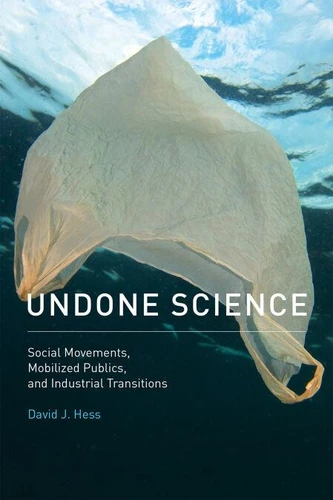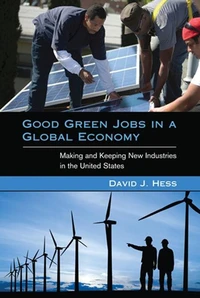Undone Science. Social Movements, Mobilized Publics, and Industrial Transitions
Par :Formats :
Disponible dans votre compte client Decitre ou Furet du Nord dès validation de votre commande. Le format ePub protégé est :
- Compatible avec une lecture sur My Vivlio (smartphone, tablette, ordinateur)
- Compatible avec une lecture sur liseuses Vivlio
- Pour les liseuses autres que Vivlio, vous devez utiliser le logiciel Adobe Digital Edition. Non compatible avec la lecture sur les liseuses Kindle, Remarkable et Sony
- Non compatible avec un achat hors France métropolitaine
 , qui est-ce ?
, qui est-ce ?Notre partenaire de plateforme de lecture numérique où vous retrouverez l'ensemble de vos ebooks gratuitement
Pour en savoir plus sur nos ebooks, consultez notre aide en ligne ici
- Nombre de pages258
- FormatePub
- ISBN978-0-262-33643-7
- EAN9780262336437
- Date de parution23/09/2016
- Protection num.Adobe DRM
- Taille724 Ko
- Infos supplémentairesepub
- ÉditeurThe MIT Press
Résumé
A theoretical integration of science and technology studies and social movement studies that finds both common ground and "undone" research. As the fields of social movement studies (SMS) and science and technology studies (STS) have diversified in topical focus, they have moved closer to each other. SMS has turned toward the study of nonstate targets and institutionalized repertoires of action, just as STS has turned to expertise and publics.
In Undone Science, David Hess argues that a theoretical integration of core concepts in the two fields is now possible, and he presents just such a synthesis. Hess focuses on industrial transition movements-mobilized counterpublics of activists, advocates, entrepreneurs, and other agents of change-and examines several areas of common ground between the two fields relevant to these movements. His account reveals the problem of "undone science"-areas of research potentially valuable to the goals of industrial transition movements that have been systematically ignored.
Each chapter begins with a problem in SMS, discusses the relevant STS literature, describes new concepts and findings that have emerged, and offers applications to examples that range from nanotechnology and climate science denialism to conflicts based on race, class, and gender. Topics include the epistemic dimension of the political opportunity structure, networks of counterpublic knowledge, and regime resistance in industrial transition.
In Undone Science, David Hess argues that a theoretical integration of core concepts in the two fields is now possible, and he presents just such a synthesis. Hess focuses on industrial transition movements-mobilized counterpublics of activists, advocates, entrepreneurs, and other agents of change-and examines several areas of common ground between the two fields relevant to these movements. His account reveals the problem of "undone science"-areas of research potentially valuable to the goals of industrial transition movements that have been systematically ignored.
Each chapter begins with a problem in SMS, discusses the relevant STS literature, describes new concepts and findings that have emerged, and offers applications to examples that range from nanotechnology and climate science denialism to conflicts based on race, class, and gender. Topics include the epistemic dimension of the political opportunity structure, networks of counterpublic knowledge, and regime resistance in industrial transition.
A theoretical integration of science and technology studies and social movement studies that finds both common ground and "undone" research. As the fields of social movement studies (SMS) and science and technology studies (STS) have diversified in topical focus, they have moved closer to each other. SMS has turned toward the study of nonstate targets and institutionalized repertoires of action, just as STS has turned to expertise and publics.
In Undone Science, David Hess argues that a theoretical integration of core concepts in the two fields is now possible, and he presents just such a synthesis. Hess focuses on industrial transition movements-mobilized counterpublics of activists, advocates, entrepreneurs, and other agents of change-and examines several areas of common ground between the two fields relevant to these movements. His account reveals the problem of "undone science"-areas of research potentially valuable to the goals of industrial transition movements that have been systematically ignored.
Each chapter begins with a problem in SMS, discusses the relevant STS literature, describes new concepts and findings that have emerged, and offers applications to examples that range from nanotechnology and climate science denialism to conflicts based on race, class, and gender. Topics include the epistemic dimension of the political opportunity structure, networks of counterpublic knowledge, and regime resistance in industrial transition.
In Undone Science, David Hess argues that a theoretical integration of core concepts in the two fields is now possible, and he presents just such a synthesis. Hess focuses on industrial transition movements-mobilized counterpublics of activists, advocates, entrepreneurs, and other agents of change-and examines several areas of common ground between the two fields relevant to these movements. His account reveals the problem of "undone science"-areas of research potentially valuable to the goals of industrial transition movements that have been systematically ignored.
Each chapter begins with a problem in SMS, discusses the relevant STS literature, describes new concepts and findings that have emerged, and offers applications to examples that range from nanotechnology and climate science denialism to conflicts based on race, class, and gender. Topics include the epistemic dimension of the political opportunity structure, networks of counterpublic knowledge, and regime resistance in industrial transition.




